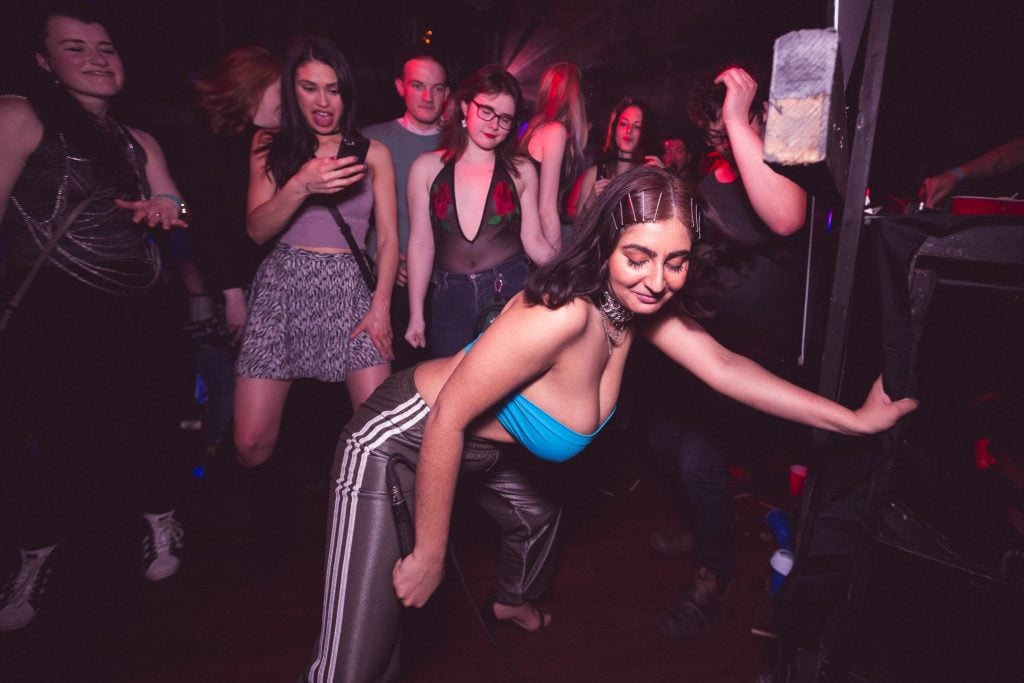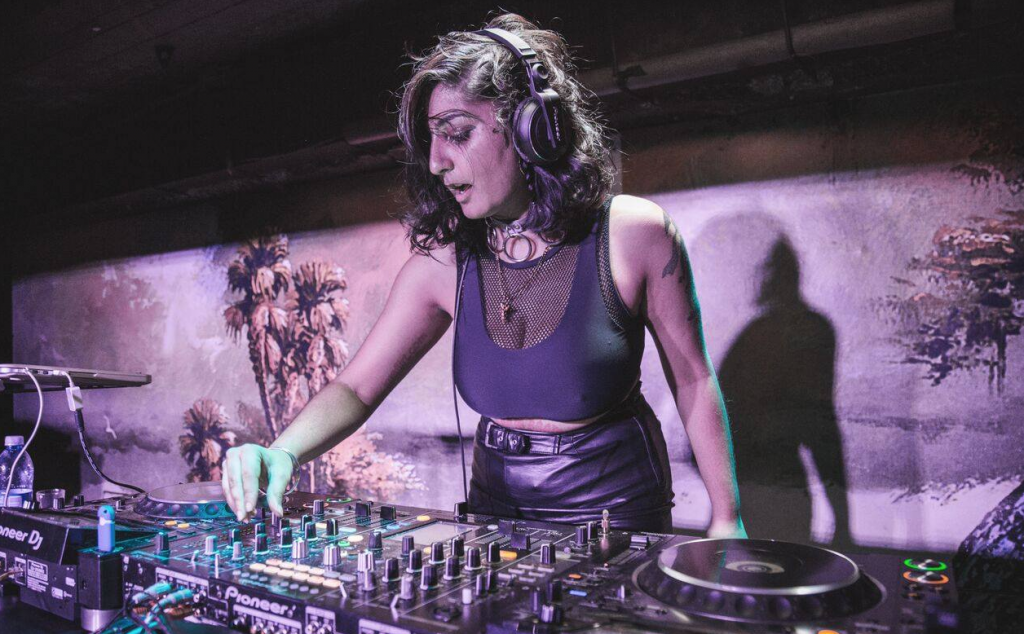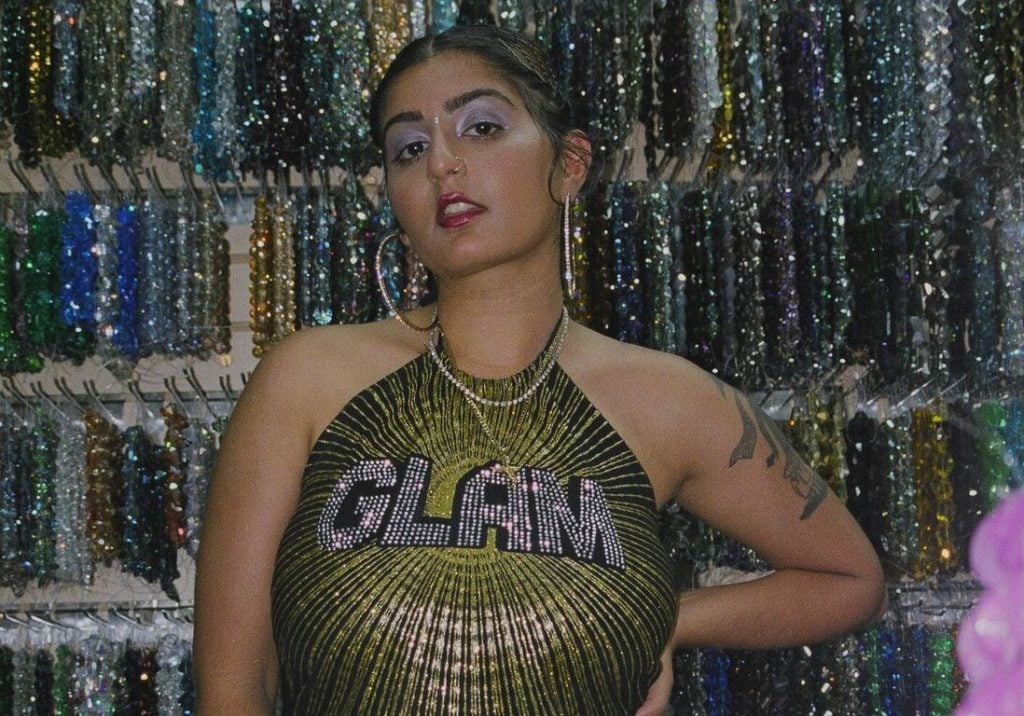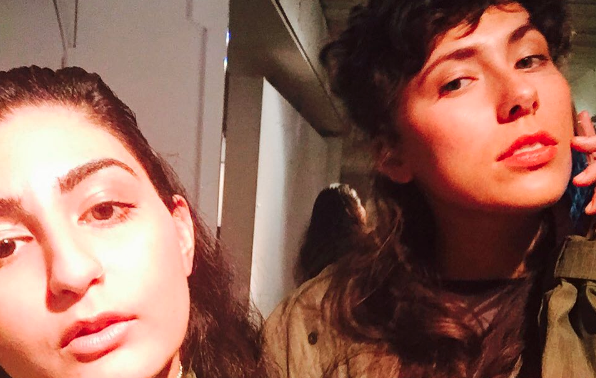A Very Honest Conversation About Dance Music With Chippy Nonstop
It's time to spill some tea.

Most people in dance music give boring interviews.
In any given chat, you’re likely to hear how the DJ in question doesn’t prefer clubs or festivals, “they’re just different”. They’ll tell you that they’ve never pre-planned a set in their life, “it’s all on fly”. That they’re not complaining, but touring is “harder than it looks”. More often than not, questions about bigger themes or the issues facing the genre are dodged with media-trained savvy, in favour of a shopping list of clichés.
It’s no coincidence that most of those artists are straight, white men. As other creative industries have started to face up to their gender imbalance and ingrained sexism — especially in the last couple of weeks — progress in dance music has been frustratingly slow.
The genre is still dominated by men. Misogyny runs rife and unchecked. Looking at the same few names at the top of every festival line-up can inspire the feeling of living in an endless Groundhog Day, one where you’re never not standing in a pile of confetti watching Hardwell ask the crowd to make some noise.
But Chippy Nonstop isn’t afraid to talk. And she’s definitely not boring.
Chippy — born Chhavi Nanda — broke into the dance music scene just as it was taking off in the US. Living in LA, she was in the right place at the right time to have a front row seat to the EDM explosion. Twitter infamy connected her with Diplo and led to to her working on the Major Lazer track ‘Wind Up’. She alternately wrote articles about blagging your way into the VIP section for Vice and kept company with A-list DJs. She led a life she describes as “comfortable” — partying, DJing, working in songwriting and releasing her own rap videos.
Then everything changed.
In 2015, Chippy landed at LAX after an 11-hour flight from Japan, excited to go home. She never made it out of the airport — customs officials detained her for close to 12 hours then put her on a flight to Canada, where she’d spent some of her childhood. She was deported and banned from re-entering the US for ten years.
Chippy had lived in the US since she was 10 after her Indian-born parents relocated, most of time legally under their visa. When she left for an Asian tour, she believed her visa papers were more or less in order. They weren’t.
With no friends, family or possessions, Chippy was faced with building her life back up from scratch in Canada. Instead of letting it break her, she ended up founding Intersessions, a series of workshops teaching women, gender non-conforming and LGBTQ+ individuals how to DJ, in the hopes of changing the straight-white-bro face of contemporary dance music.
It’s been a hit — so much so that next month Chippy Nonstop will come to Australia for the first time, speaking at and running Intersessions workshops with Face The Music. In the lead-up, we got on the phone for a very honest conversation about all of dance music’s bullshit.
It seems like when you were living in LA you probably were in close proximity to some pretty awful EDM bros, even just by virtue of being in North America.
Yeah. I worked with Diplo, I was on the Mad Decent trajectory when I was 19, I was in that scene.
Not to say that there’s not good people within that scene, it’s just they don’t think about [other people] at all. And there’s a lot of shitty people, too. But there’s just a lot of people who grew up rich, grew up in Hollywood, became an EDM bro and then lived their life with their other bros and didn’t really think about it.
“When you don’t grow up with any obstacles, you don’t think about other people’s obstacles”
Some people want to be aware, but when you don’t grow up with any obstacles you don’t think about other people’s obstacles. So I think a lot of it was obliviousness. And even for me, I would be struggling and crying at night being like, “Why are they like this? Why are they treating me like this?”
Even I wasn’t self-aware to realise that, a lot of the time, it was sexism. I was just like, “Oh, this is just what the industry is.” And it took having time to step back, and step out of that scene, to realise that it’s like that.
Now that I’m older and away from it I understand that they were fucked up. They were sexist, they didn’t treat me right. I obviously succumbed to using my body for certain things, because that’s the industry. And now looking back on it I’m like, “Woah”. There was a lot of fucked up shit that happened. I was super young and didn’t realise what was going on.
So yeah, I dealt with a lot of bullshit. There’s so many things that made me aggressive and made me passionate about Intersessions, and I didn’t realise then until I just started doing it.

Chippy Nonstop // Photo via Facebook
Now that you’re out of that scene you like — thank fucking god?
Yeah, I mean, I still hit up people that I’m friends with. I don’t want to put anyone’s name on blast but I’m friends with people that would be quote unquote “EDM bros” in the bro culture, and they have a lot to learn. Even if they’re still assholes, I talk to them say “You’re a fucking asshole. What are you doing? Step out of your own lives for a second and see the other side.”
Even if they won’t do it now, maybe they’ll book a woman to open for them on tour later on. These big EDM DJs should be saying, “If I’m playing this festival, there should be at least this many women playing, or this many queer people playing, or this many people of colour playing.” If you’re fucking Tiesto, you have the power to say no. If you’re that big, you can say that, or make it your rider requirement. But a lot of people in EDM just don’t want to think about it.
But I don’t like to say that I’m happy to be out of that scene, because I still want them to understand our perspective.
What was your experience of working with Mad Decent?
I was just really excited. M.I.A. was one of the first English speaking brown pop stars that I knew of. So I was just on Twitter shooting the shit and saying random shit, and for some reason Diplo followed me when I was really young. I got all involved in that scene and I was just really, really excited.
I was really loud, really vocal, said whatever the fuck I wanted. For the Major Lazer album, I didn’t know but it took so long to get paid — I barely got paid for what I did and I posted about it. And I was 19. I would probably do that in a smarter way now, because I didn’t realise that being that much of an aggressive, assertive woman was really intense for them.
Me and Diplo don’t get along now. He messaged me like, “After all Mad Decent has done for you, this is what you do?” and I was like, “You know what? I was just speak what is happening to me and what is going on, and it’s nothing against you or Mad Decent.”
What’s the vibe generally in North America now with EDM? Are people still into it? It feels pretty dead here in Australia.
Well in Toronto it’s dead, pretty much. There was this one venue called The Hoxton that had all the EDM events and it got shut down.
Every now and then I love going to an EDM concert, getting fucked up and trolling and stuff, but it’s definitely a troll. I’m not like, “Woah, this is fucking amazing music.” But as far as my friends go, they don’t listen to EDM anymore, I don’t think. It’s just kids that listen to it. It’s died down a lot.
It’s not really a safe scene, it’s not really relatable for a lot of people of colour, other than Jersey club or Baltimore club. Some music is still really vibrant, but not EDM EDM.
On the note of EDM not being safe for people of colour — have you seen the “All Lives Matter” shit Ghastly has been tweeting lately?
Yeah, even Lido jumped to that. But those guys were a little bit after my time. I was more in [the era] when Dillon Francis and all those people were popular. I guess he’s in the same scene. They’re all the same.
Wait, Lido’s been posting that stuff as well?
Yeah, Lido posted “All Lives Matter”, and there was huge fight because he posted something dumb and then all Jersey club artists weren’t speaking with him. Then he started posting about all the Jersey club artists that he respects. Right after his rant about Jersey club he posted “All Lives Matter”.
What do you think the biggest issue facing dance music right now is?
This is personal, but a lot of the time when I do Intersessions, I get a lot of hate messages from guys, like — “why is this workshop just for women?” Or “why is this for LGBTIQ people, and women, and people colour? Why is this necessary? I don’t get it.”
This is even an issue in the world in every form. But basically people don’t realise that when we were young, women weren’t the ones people would ask for help with technology. When the computer was broken, my mum would go to my brother. If the teacher in class needed help with the projector, they would look at a boy. Women were not supposed to be the fixers of technical stuff, and music is really technical.
“They think that they’re on that stage because they’re the best. That’s just not the case.”
Guys don’t understand that we can’t be at the same level right away because we’ve grown up this whole time thinking that we’re not the one who can do this.
I think that’s the main issue — that guys just don’t understand. They’re always saying, “why can’t you just do it?” The answer is because they got a head start.
That’s the thing that white dudes, especially, will never understand. Especially in a scene where suddenly white dudes are playing mainstages, and they think that they’re on that stage because they’re the best. That’s just not the case.

Chippy Nonstop // Photo via Facebook
You got deported from the US a couple of years ago. That must have been a super low time for you.
Yeah. For six months I was in a really dark place and I was just like, “What am I gonna do? What the fuck?” But when bad shit happens you tend to want to bring yourself up even higher than you were before, you know? So I took the bad and made it better.
I was going to say that it seems like things have really taken off for you since then. Was it a blessing in disguise?
Yeah, definitely. I was in LA, and I was in a comfortable position, and whenever you’re comfortable you don’t work as hard. So when I came here I had literally nothing, I didn’t know anyone, all I had was one carry-on bag. All my possessions were in California.
Starting from scratch really makes you want to just work even harder. It was a blessing in disguise, but definitely it was a lot of myself seeing that I had to change and do something different. I had to figure out what I was gonna do from here, because I knew I couldn’t do the same shit I was doing in California.
Do you mind talking through what actually happened when you didn’t get let back in to the US, what it was like, and how you were treated by customs officials?
So basically I was in Japan, I had played a show, and then when I got off the plane to the US they took me into this room and I didn’t really know what was happening.
I still am kind of iffy on all of the details, but basically there was something wrong with my visa paperwork. I had gone back and forth from different visas several times. But I had no idea that this is happening, because I’d grown up in America since I was 10 years old, so I just thought that was my home. I never really looked into my paperwork like that, I was just kind of oblivious.
I was with other people at first, then I was put into a smaller room and told to wait there. They took away all my possessions. I was wearing a jacket that had a drawstring in it, and they took away that and my shoelaces, and anything I could hurt myself with, because I was pretty hysterical.

Chippy Nonstop // Supplied
Then I was sitting in the room for a few hours and still had no idea what was happening. They took away my phone, but I saw it in a hallway and grabbed it — because I was like, at this point no one knows where I am, none of my family or anyone. I had just enough time to text my mum and my boyfriend at the time to say “I’m not coming out, I don’t know what’s happening.”
Then they found out that I took my phone and took me into questioning. They were super rude. At first, they were calling me my real name — Chhavi — then they came out and started calling me Chippy. They were laughing and looking at all my social media, reading it out loud and watching my videos. I was just still hysterical, I was in a mess and didn’t know what was going on.
They told me “Well, you’re not going to go home, so where do you want to go?” They told me I should go to Canada. I was at LAX, so I went to Vancouver because that’s the closest city.
That’s after 10 or 12 hours, I think. I’m still not 100 percent sure because I was all confused. I had to pay for my flight, they escorted me to the plane, and I flew to Vancouver. And I don’t know really anyone there, and I just had to post on Twitter like, “Can anyone in Vancouver help me?” And this girl that I vaguely knew on Instagram messaged me, she came to my hotel because I didn’t feel like being alone after all of that.
I haven’t even tried to re-enter but apparently I’m banned for 10 years, so eight years to go.
Do you think you even want to move back to the US in eight years?
I don’t plan on living there. I plan on being in Canada, but I’d definitely love to still play there and tour there. My mum and dad still live there, and my brother lives there, so it’s still my family home.
Can you tell me about how you started to rebuild you life in Canada?
Honestly, I had a following online already. So a lot of people helped me out and were insanely helpful. And then all these articles came out about my deportation and people just wanted to help.
My good friend Brittney Scott was going to Paris to chill and do some work stuff, and I didn’t have a social security number in Canada at that point, so I couldn’t work there. Now I do, but at that point I didn’t. So she was like, “Just come to Europe, work here for a bit,” so I did that. I played a mini-tour in Europe and just fucked around for a while, and then I realised I had to find a home and be from somewhere so I went back to Vancouver to figure shit out.
“I wasn’t happy with the scene there, and there’s just not a lot of diversity in sound”
And then I wasn’t getting paid what I deserved for gigs and a lot of older dudes just ran the scene there. I wasn’t happy with the scene there, and there’s just not a lot of diversity in sound.
Coming from LA, I could play whatever music I wanted when I DJ’d and people understood it but in Vancouver it just wasn’t the same. So I was unhappy with that. Me and my friend Rhi Blossom started Intersessions because of that — our unhappiness with the scene there.
And then I pretty much couldn’t take it anymore so I moved to Toronto, which is a lot more diverse than Vancouver. And now I’ve just been working in Toronto and still travelling a lot.

Chippy Nonstop // Photo via Instagram
So the scene in Canada is very male dominated?
In Vancouver, not really in Toronto. In Toronto, bands and women run shit. But in Vancouver it was a lot of older men that were guarding the scene.
It’s changed actually a lot in the last six months or year. Even just since we started Intersessions about a year and a half ago, it’s changed so much there. I mean, I don’t want to take credit for all of that, but a lot of women have come forward and started throwing parties.
Can you tell me more about what you guys do with Intersessions and the workshops that you run?
So basically one of the dudes who runs a venue in Vancouver hit up Rhi, and was like, “Hey, we have this space, do you want to do something here?” We had both talked about wanting to do workshop things or mentorship programmes, but we just didn’t have the resources. There’s very limited spaces in Vancouver, and limited access unless you’re rich.
So basically we were like, “How do we go about this?” We kind of just begged, borrowed and asked people for equipment, and threw together really, really DIY workshops. But with the help of a bunch of other teachers there we put together this workshop and it just went really well. The energy in the room was amazing and all the students just were really inspired, and it was amazing to see.
So when I moved to Toronto I knew I needed to continue doing it. I came here and the workshop went well, and then people just kept hitting me up to do more and more workshops, so we moved it to all different places. I’ve done a few Europe ones, and now I’m coming to Australia to do them within touring.
We’ve talked a lot about bad people in dance music, but are there any good people in dance music that you want to shout out?
Doing Interessions just gave me so much hope, because everyone’s always saying how women are catty towards each other and it’s really not the case.
Almost every single woman, and queer person, and person of colour has asked to [volunteer for] Intersessions. It’s a free event. I give them what I can, but they’ve all also volunteered three hours of their time to teach other friends, other queer folk, other people of colour. They donate all their time. Honestly, a dude wouldn’t do that. Most guys wouldn’t do this for other guys because they’d be like, “oh well I did it on my own, so they should be able to do it on their own too.”
“Most guys wouldn’t do this for other guys”
But for the majority there have just been so many women that have taught at Intersessions, all over the world, pretty much for free. That gave me a lot of hope, especially in us supporting each other.
I just want to shout out the women, because there have been so many. The list goes on forever. There’s been over 40 workshops and there’s been at least three to five teachers in each workshop.
You started out making a bunch of rap tracks and videos. How do you feel looking back on them now?
I still like them. I don’t take myself that seriously. There’s serious things that I do take seriously, but music at the end of the day is fun and it’s about having fun. I’d had so much fun in the process of making all of that. So I look back on it and sometimes I’m like, ‘oh my god’, but at the same time it was so fun.
And all my music videos have close homies in all of them. The production is mostly me and really close homies, so it was always a really good experience when I was doing my solo project. It was just when I was working with other people’s music that there was darkness.
You were one of the first wave of people to become Twitter famous. What’s your view on self-promo, and do you think it’s a necessary evil for creative people?
I started off when I was 16 I was lying about my age and writing for magazines, going to concerts, and tweeting. Funny shit, dumb shit. So I just started using it as a diary and I don’t know how, but it just picked up. Now I’m just so used to it. I still use it as a diary, when I’m drunk or when I’m pissed off. Only now I have a little more of a filter than I used to. I don’t think of it as self-promo because I grew up doing it, so it’s just an innate thing that I do.
What’s the future hold for you? What’s your game plan from here?
I’m working on making music, vocals and production. I would like to eventually do a whole project that I produce myself, write myself, sing myself and rap myself.
Right now, I’m working on a few new vocal projects with a few different producers and myself also. I just want to get better at production and tour it. Because of Intersessions I’ve met so many talented people and I feel like, eventually, we could start a roster of a booking agency and help a lot of people get gigs. So I might want to do something like that.
But yeah, travel a lot, help culture grow, learn about culture in different place and have fun. I’m not trying to be a giant popstar or anything.
Do you know much about Australian electronic music? Are there people you want to link up with while you’re here?
I know the main people. I saw that Mallrat was on the line-up. So I hit her up and we talked about making a song. I’m making music already ready with Mall Grab. He’s gonna be there, in Australia. I hit up Nina Las Vegas and some other people.
—
Chippy Nonstop will appear at Face The Music on November 23-24. Find out more here.
—
Katie Cunningham is the Editor of Music Junkee and inthemix. She is on Twitter.


